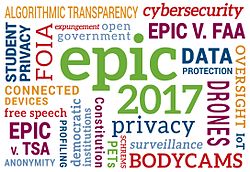Electronic Privacy Information Center
| Abbreviation | EPIC |
|---|---|
| Formation | 1994 |
| Type | 501(c)(3) nonprofit organization |
| Purpose | privacy, freedom of expression, democratic values, open government |
| Location |
|
|
Executive Director
|
Marc Rotenberg |
| Website | epic |
Electronic Privacy Information Center (EPIC) is an independent non-profit research center in Washington, D.C. EPIC's mission is to focus public attention on emerging privacy and related human rights issues. EPIC works to protect privacy, freedom of expression, and democratic values, and to promote the Public Voice in decisions concerning the future of the Internet.
EPIC is involved with wide range of civil liberties, consumer protection, and human rights issues. EPIC has pursued several successful consumer privacy complaints with the US Federal Trade Commission, concerning Snapchat (faulty privacy technology), WhatsApp (privacy policy after acquisition by Facebook), Facebook (changes in user privacy settings), Google (roll-out of Google Buzz), Microsoft (Hailstorm log-in), and Choicepoint (sale of personal information to identity thieves). EPIC has also prevailed in significant Freedom of Information Act cases against the CIA, the DHS, the Dept. of Education, the FBI, the NSA, the ODNI, and the TSA. EPIC has also filed many "friend of the court" briefs on law and technology, including Riley v. California (U.S. 2014) (concerning cell phone privacy), and litigated important privacy cases, including EPIC v. DHS (D.C. Cir. 2011), which led to the removal of the x-ray body scanners in US airports, and EPIC v. NSA (D.C. Cir. 2014), which led to the release of the NSA's formerly secret cybersecurity authority. EPIC also challenged the NSA's domestic surveillance program in a petition to the US Supreme Court. In re EPIC, (U.S. 2013) after the release of the "Verizon Order" in June 2013. One of EPIC's current cases concerns the obligation of the Federal Aviation Administration to establish privacy regulations prior to the deployment of commercial drones in the United States.
...
Wikipedia


